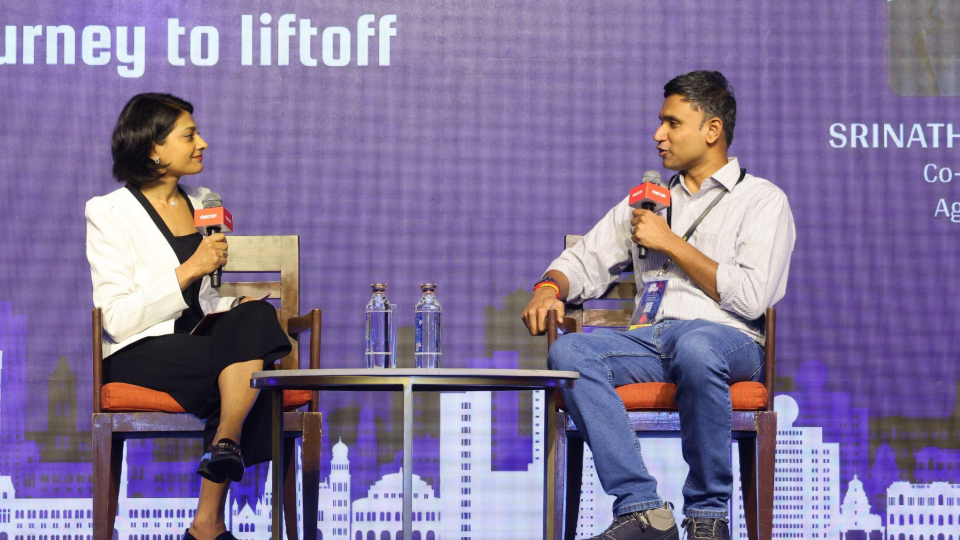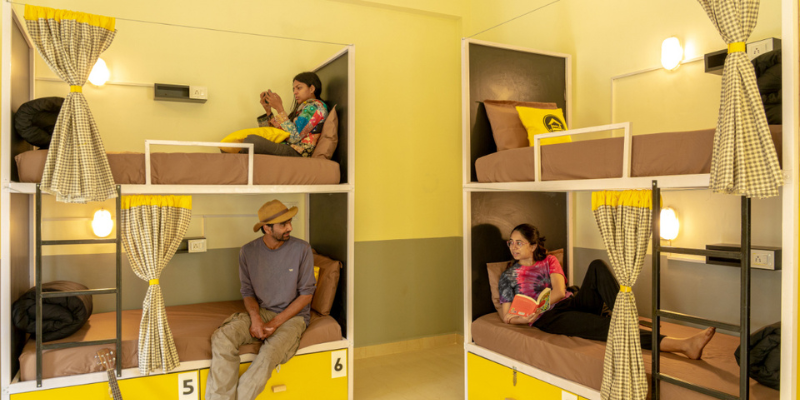Startup
Space is not an exclusive domain for the wealthy; it’s crucial to demystify this myth: Agnikul CEO

The poster boy of India’s space industry, Srinath Ravichandran, Co-founder and CEO of Agnikul Cosmos, believes it’s crucial to demystify the perception that space is an exclusive domain for boys and the wealthy.
“All the big startup stories in the US for space still seem to be driven by billionaires or people who were already billionaires or close to it before they started. Take Elon Musk or Jeff Bezos, for example. Here (in India), none of us had that kind of money to start,” Ravichandran told a packed audience during a fireside chat at Tamil Nadu Story 2024, YourStory’s flagship event that strives to empower the startups and homegrown brands of Tamil Nadu.
However, the perception that space is for the rich is gradually changing in India, asserted Ravichandran. It fascinates many people, particularly young people who are “super excited” about it, he added. This excitement reminds him of why he got into the field in the first place.
This is the reason why Ravichandran tries to spend a lot of time with anyone who wants to do something in space.
“I grew up as an aerospace enthusiast … Being able to actually attempt building a real rocket that can go to space from Chennai is a dream come true,” said a jubilant Ravichandran.
Enabling the ecosytem
Chennai-based Agnikul Cosmos, a startup incubated at IIT-Madras, was founded in 2017 by Ravichandran and Moin SPM.
After four failed attempts, the spacetech startup made history on May 30 this year, with a triumphant sub-orbital test flight of its launch vehicle, Agnibaan SOrTeD (suborbital technological demonstrator), powered by the Agnilet engine—the world’s first single-piece 3D-printed semi-cryogenic rocket engine.
“It is still surreal. I sometimes play the video at night, and it still doesn’t feel like it actually happened, even though it did,” shared the Agnikul CEO, who started his career as a Wall Street trader but soon realised he was an engineer at heart.
Ravichandran stated that, since May 30, at least 10-15 people have reached out to him saying they want to start something in space.
“In a small way, we are enabling the ecosystem, so that is a great feeling,” he said.
India’s growing space sector
The space sector, which is opening up in the country, will branch off into two streams, pointed out Ravichandran.
He explained that the ISRO (Indian Space Research Organisation) community will focus on areas where there are no business models–such as the first human mission to orbit from India and the Indian Orbital Space Station, officially called ‘Bharatiya Antariksha Station’. And for areas that ISRO has already addressed and where business opportunities exist, it’s up to startups to take them forward, the Agnikul chief added.
Apart from Agnikul, Skyroot Aerospace, Pixxel, Dhruva Space, and Bellatrix Aerospace are some of the other startups driving innovation in both space launches and downstream technologies.
“How should a successful private launch company in India be? That is still being figured out, or rather, we are all in the process of figuring it out,” said Ravichandran.
Agnikul is betting on 3D-printed rocket engines for affordable space launches. Explaining the reasoning behind choosing this approach, Ravichandran said it was because people are waiting for too long to get to orbit. To reduce launch times, it had to make rockets quickly; one focus area is to expedite the production of rocket engines, which take the most time, he added.
“Our team has come up with a technology where the entirety of the rocket engine is printed in a single shot without any human interference. In a way, it is like automated engine making,” he said.
3D printing enables the startup to iterate hardware as quickly as software.
The Agnikul chief said that anyone with a payload should consider three things: mass (which determines the cost), destination, and origin.
Ravichandran pointed out that the goal is to develop a framework wherein, with just these three inputs, a launch can be scheduled within two weeks. 3D printing, mobile launch pads, and modern avionics are all steps toward solving this challenge. That’s how Agnikul is working to make space more accessible, he said.
The startup will also focus on reusability going forward, Ravichandran said, adding, “Our vehicles are capable of being reused … Every launch from now on will have a secondary objective of testing technology related to recovery.”
According to the Agnikul CEO, the spacetech firm is actively working on having a multi-mission testing plan, so that, within the next 10 missions, the startup will be fully sustainable from a vehicle standpoint.
“The deorbiting protocol is something that we want to follow; our vehicles will not be in orbit, if they don’t have to be in orbit,” he added.
Space agencies worldwide aim to use reusable launch vehicles for rockets to save millions of dollars. Private space tech companies such as Musk-led SpaceX and Bezos-led Blue Origin are developing fully reusable launch vehicles.
“Do your job and come back,” Ravichandran remarked, adding, “It’s a vehicle; it should not just go and stay where it goes.”
Startup
Hosteller raises Rs 48 Cr in Series A round led by V3

Backpacker hostel brand The Hosteller has raised Rs 48 crore in a Series A funding round. V3 Ventures led the equity round, contributing Rs 32 crore, with Blacksoil providing an additional Rs 16 crore in venture debt.
Other key investors include Synergy Capital Partners, Unit e-Consulting, Real Time Angel Fund, and several high-profile investors like Harsh Shah from the Naman Group Family Office.
The investment will allow the company to strengthen its presence in cities like Rishikesh and Manali, while also expanding into new destinations across India.
“We aim to have 10,000 beds by March 2026 from the existing 2,500 beds. Backpacker hostels have become the go-to choice for GenZ and millennial travellers in the post-covid era. The fresh capital will not only accelerate our expansion but also help us acquire customers from the newer territories,” Pranav Dangi, Founder and CEO of The Hosteller, said in a statement.
“We noticed a change in the way GenZ travels–from saving up for 1 holiday a year to travelling every long weekend. And, The Hosteller fulfills this exact need. With a standardised, tech-first, budget-friendly option – the brand offers something truly unique to its customers. This makes us even more excited about the growth ahead. The Hosteller has demonstrated outstanding execution capabilities in the consumer and travel space,” Arjun Vaidya, Co-founder of V3 Ventures, said.
Hostel companies are significantly benefitting from the rise of digital nomadism, a trend that has reshaped the hospitality landscape. Digital nomadism refers to a lifestyle where individuals leverage technology to work remotely while traveling to various locations. This modern way of living allows people to combine work and travel, enabling them to explore new cultures and environments without being tied to a specific office or geographical location.
The Hosteller was founded by Pranav Dangi in 2014. It began with the vision of creating accessible and affordable backpacker hostels across India, aiming to cater to the needs of young travelers. Since its inception, The Hosteller has rapidly grown to become one of India’s largest self-operated backpacker hostel chain, with a presence in over 55 destinations across the country.
Startup
Magenta Mobility’s FY24 revenue rises three fold, losses widen by 17.1%

Magenta Mobility on Thursday reported a 199.5% jump in its full-year revenue to Rs 35.53 crore compared to Rs 11.86 crore in the previous year helped by a significant rise in its revenue from services.
The company provides a 100% electric fleet and AI and IoT-enabled fleet management and data analytics platform to optimise logistics operations and deliveries. Revenue from these services for the year ended March 31, 2024, increased to Rs 30.17 crore compared to Rs 10.15 crore in FY23.
However, the company reported a 17.1% increase in its loss for the period to Rs 46.44 crore as opposed to Rs 39.66 crore in FY23, bogged down by rising expenses during the year. The 109.1% rise in expenses to Rs 90.17 crore was primarily due to rising driver costs, employee benefit expenses, and finance costs.
Magenta Mobility appoints drivers on a contract basis to provide services to its customers, which it accounts as an expense. The drivers’ cost for FY24 increased to Rs 18.49 crore, compared to Rs 6.34 crore in FY23.
The rise in demand for the company’s fleet comes amidst a boom in the last-mile delivery sector in India owing to the rise of ecommerce and quick commerce players. Magenta Mobility caters to clients such as Flipkart and hyper-local delivery platform Dunzo, among others.
Founded in 2017 by Maxson Lewis and Darryl Dias, the company last raised $22 million in a Series A funding round from BP Venture and Morgan Stanley India Infrastructure-managed investment fund.
Startup
Juspay cuts losses by 7.7% as revenue surges 49.6% in FY24

Payments startup Juspay Technologies saw its losses narrowing in FY24 as revenue growth outpaced expenditure. It narrowed its total loss for the period to Rs 97.54 crore, down 7.76% from Rs 105.75 crore in FY23.
According to the consolidated financial statements accessed from the Registrar of Companies, the SoftBank-backed fintech firm’s revenue from operations surged 49.64% to Rs 319.32 crore, up from Rs 213.39 crore in FY23.
Juspay’s primary revenue source—payment platform integration fees—brought in Rs 286.52 crore. Additional operating revenue from services like product implementation and support added Rs 32.80 crore.
Total expenses rose by 29.52% to Rs 443.74 crore in FY24, compared to Rs 342.59 crore in the previous year. This increase was largely driven by employee benefit expenses, which saw a 41.73% jump to Rs 303.36 crore, while other expenses increased slightly over 3.56% to Rs 123.76 crore.
Juspay, founded in 2012 by Vimal Kumar and Ramanathan RV in Bengaluru, specialises in developing payment orchestration solutions that act as a technology layer over traditional payment gateways.
The Accel-backed startup has also developed Namma Yatri, a mobility app focusing on ride-hailing services, leveraging Juspay’s strengths in payments and open-source protocols. Namma Yatri is built on the Beckn Protocol and aligns with the Open Network for Digital Commerce (ONDC), aiming to provide low-cost ride-hailing options and open access to digital mobility services.
Recently, Juspay decided to spin off Namma Yatri as an independent entity to attract separate investors and scale further. In February, the company said it acquired LotusPay in an all-cash deal to strengthen its offerings to the BFSI segment and merchants.
LotusPay, founded in 2016, pioneered NACH Debit technology with cloud-based software for merchants and banks. Using NPCI’s NACH Debit, it facilitates recurring payments for loans, insurance, and subscriptions.
-

 Startup Stories1 year ago
Startup Stories1 year agoWhy Millennials, GenZs Are Riding The Investment Tech Wave In India
-

 Startup Stories1 year ago
Startup Stories1 year agoStartups That Caught Our Eyes In September 2023
-

 Startup Stories1 year ago
Startup Stories1 year agoHow Raaho Is Using Tech To Transform India’s Fragmented Commercial Trucking
-

 Startup Stories1 year ago
Startup Stories1 year agoMeet The 10 Indian Startup Gems In The Indian Jewellery Industry’s Crown
-

 Crptocurrency8 months ago
Crptocurrency8 months agoLither is Making Crypto Safe, Fun, and Profitable for Everyone!
-

 Startup Stories1 year ago
Startup Stories1 year agoHow Volt Money Is Unlocking The Value Of Mutual Funds With Secured Lending
-

 Startup Stories1 year ago
Startup Stories1 year agoWhy Moscow-Based Kladana Considers Indian SME Sector As The Next Big Market For Cloud Computing
-

 E-commerce1 year ago
E-commerce1 year agoTop Online Couponing Trends To Watch Out For In 2016




